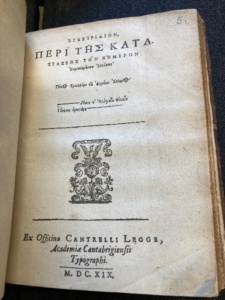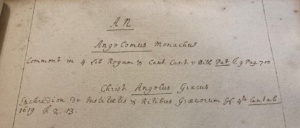An early modern character reference
 This month we explore the career of Christopheros Angelos, a monk who travelled to England from Greece in the seventeenth century. From the Peloponnese he travelled to Athens, which he left, claiming religious persecution from the Ottoman Empire. Having been suspected of being a Spanish spy and subsequently tortured by the Ottomans, he arrived in England where he positioned himself as a religious refugee.
This month we explore the career of Christopheros Angelos, a monk who travelled to England from Greece in the seventeenth century. From the Peloponnese he travelled to Athens, which he left, claiming religious persecution from the Ottoman Empire. Having been suspected of being a Spanish spy and subsequently tortured by the Ottomans, he arrived in England where he positioned himself as a religious refugee.
Angelos went to Cambridge, where he clearly found benefactors and supporters, notably John Gostlin of Gonville and Caius College. He later travelled to Oxford for health reasons (seemingly the Oxford air was preferable to Cambridge) where he remained until his death, teaching Greek at Balliol College. His publishing output appears to be quite sizable and his works in Greek were notable for being the first of their kind written in England.
Univ Library holds a copy of one of his works, bound with some miscellaneous pamphlets. Curiously, bound within the original Greek and Latin translation of Angelos’s Enchiridion de institutis Græcorum (refer to Fig 1 in the gallery below), is a printed testimonial of his ‘honest behaviour’ signed by a number of academics from both Cambridge and Oxford Universities, as well as the Bishop of the Diocese of Salisbury (Sarum). It is a broadsheet, consisting of a single printed page, with text on one side (refer to Fig.2 in the gallery below). Broadsheets were popular at the time for printing ephemera.
What is of note, is the number of contemporary academics who were willing the sign these letters of recommendation that would allow him to travel around the country. Signatories include Arthur Lake (one of the translators of the King James Bible) and various Deans and Wardens of Oxford Colleges. A possible link to Univ comes from Sebastian Benefield (Minister and deputy vice-chancellor of the University) whose career was advanced by George Abbot, the master of Univ from 1597-1610 shortly before these publications were made.
Angelos’s published works capitalised on the anti-Ottoman zeitgeist. His autobiography concerning his ‘stripes and torments inflicted by the Turkes’ was published in 1617, the same year that the Oxford academics signed their character reference. In a post-Reformation country, many of the signatories (as prominent Church of England clergymen) ascribed to Calvinist views. Angelos may have garnered support from scholars and clergymen due to an interest in the Eastern Greek Church arising from distrust of Roman Catholicism and Islam.
According to one of the Library’s handlists, staff at the Bodleian identified Univ’s copy of the broadsheet as rare and it was deposited in the Bodleian in the 1940s along with other rare books from Univ’s collections (refer to Fig 3 in th gallery below). Because a number of copies of the broadsheet survive, we know that the text was printed in at least two print runs. The Bodleian holds three copies, one of which is similar to the one held at Cambridge, which has a different spelling of ‘beene’. This leads to the question of who the intended readership was. Did Angelos carry multiple copies to hand out to prospective patrons, using the broadsheet as a kind of passport of prestige? Why did he not favour a handwritten copy?
It is not clear how many of the broadsheets were printed or indeed if Angelos ever used these letters to travel around England, but nonetheless it is a fascinating insight into one man’s efforts to secure status and patronage in a new country. Angelos was clearly popular in Oxford and remained at Balliol until his death in 1638, when he was buried in St Ebbe’s churchyard.
Gallery
References
Alastair Hamilton, Angelus, Christopher (d. 1638) (Oxford Dictionary of National Biography, 23 September 2004)
Christopheros Angelos Enchiridion de institutis Græcorum (Cambridge, 1619)
Efterpi Mitsi, “Angell in Oxford: The Travails of a Greek Monk in Seventeenth-Century England.” In Greece in Early English Travel Writing, 1596–1682 (New York, 2017)
Nil Palabiyik ‘Redundant Presses and Recycled Woodcuts: The Journey of Printing Materials from London to Constantinople in the Seventeenth Century’ in The Papers of the Bibliographical Society of America Vol. 110, No. 3 (Chicago, 2016)
Robert Browning, ‘Some early Greek visitors to England’ in Meletēmata stē mnēmē Vasileiou Laourda (Essays in memory of Basil Laourdas) (Thessaloniki, 1975).
Published: 25 July 2024



